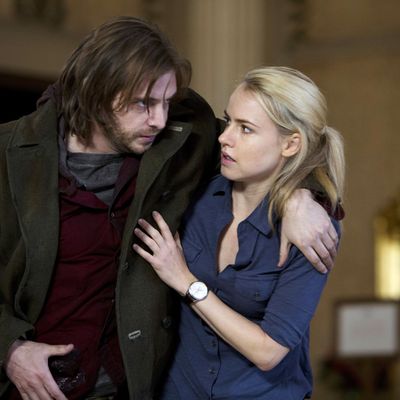
The clich├® about TV being movies extended past their natural lifespan is reductive, but itÔÇÖs not always wrong. 12 Monkeys is one example, unfortunately. I say ÔÇ£unfortunatelyÔÇØ because, even though this adaptation of the same-titled 1996 film about a time-traveler trying to prevent a humanity-exterminating plague has many fine qualities, the conversion from film to TV series kills the originalÔÇÖs finely honed sense of clockwork inevitability, along with most of the storyÔÇÖs poetry. In its place, the show substitutes what you might call prose values: lots and lots of scenes of people talking about whatÔÇÖs happening and what it means, and then sneaking around or running or getting in fistfights, and occasionally getting close to the information or people theyÔÇÖre desperately seeking only to be thwarted, by choice or circumstance, because if they werenÔÇÖt thwarted, the show would end, or be a lot shorter, or be a movie.
In a way, you could see this series from writer-producers Travis Fickett and Terry Matalas as a continuation of a process that started 20 years ago, when screenwriter David Webb Peoples (Unforgiven, Blade Runner) teamed up with director Terry Gilliam (Brazil) to make a feature-length dramatic riff on Chris MarkerÔÇÖs still-frame short movie La Jet├®e. Marker, who died in 2012, was a poet and philosopher as well as a filmmaker; like a lot of his work, La Jet├®e packs rather than unpacks its Mobius-strip narrative. The rather slight story begins and ends with the same event viewed from a different perspective (or with a fresh and tragic understanding); itÔÇÖs a a worm eating its own tail (tale?) and, as such, it makes the viewer ask basic questions about free will versus fate. GilliamÔÇÖs feature version made space for a bit of that, but it was a lot more prosaic about the plot and the characters. That was fine, though, because the characters (played by Bruce Willis, Madeleine Stowe, and a twitchy, pop-eyed Brad Pitt) were fascinating and often moving ÔÇö and because the filmmakers made sure to include lots of touches that connected the feature to MarkerÔÇÖs work and to film history generally, including a rather long riff on Vertigo, a movie that, in its heart, is about redeeming past errors and resurrecting the dead, which is exactly what Bruce WillisÔÇÖs time-traveler Cole was trying to do for humankind.
This new version is content to fuse La Jet├®e, Twelve Monkeys, and a lot of more-conventional time-travel movies, specifically the Terminator franchise, with its superhuman cyborgs and nearly superhuman cyborg-battling warriors. Where Cole was an ordinary (if capable and brave) man in GilliamÔÇÖs movie, here heÔÇÖs practically a superhero, a synthetic savior bred in the postapocalyptic future for maximum durability. (A doctor describes him as ÔÇ£a flesh-and-blood molecular computer, programmed for what, IÔÇÖve no idea.ÔÇØ) Aaron Stanford gives the character a nervous, furtive energy that undercuts the action-heroism, but heÔÇÖs still mainly a vehicle for exposition: a means of filling out and understanding the showÔÇÖs comic-book-style ÔÇ£universe.ÔÇØ StoweÔÇÖs character in the 1995 movie, Kathryn Railly, was a psychiatrist at the mental hospital where Cole was incarcerated. This version changes her to Cassandra Railly (Amanda Schull), a scientist and plague expert who meets Cole in 2013 (briefly), believes his prophecy, then becomes an outcast in her field, dismissed as a kook peddling armageddon fantasies. The name Goines, originally assigned to PittÔÇÖs asylum inmate, is here granted to Zeljko Ivanek, a man blamed in 2043 for somehow jump-starting the plague; heÔÇÖs got a daughter named Jennifer (Emily Hampshire), whoÔÇÖs been institutionalized and who might or might not be the real architect of the coming plague years. Tom Noonan shows up as a mysterious, monologuing killer in episode two; heÔÇÖs characteristically typecast and just as characteristically excellent. But none of the performers can do much to enliven a show that, judging from the two episodes sent to critics, is comprised mainly of padding.


